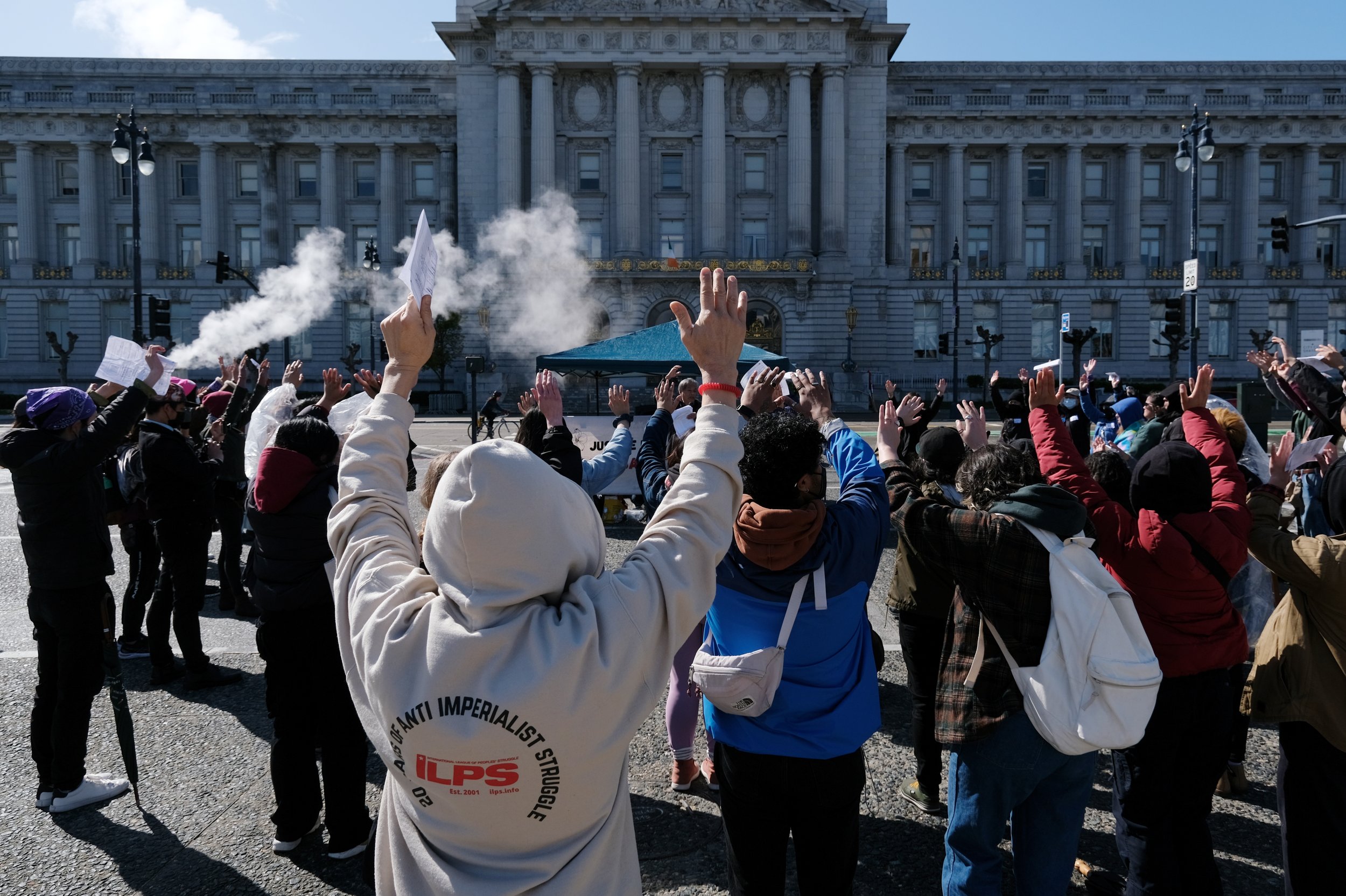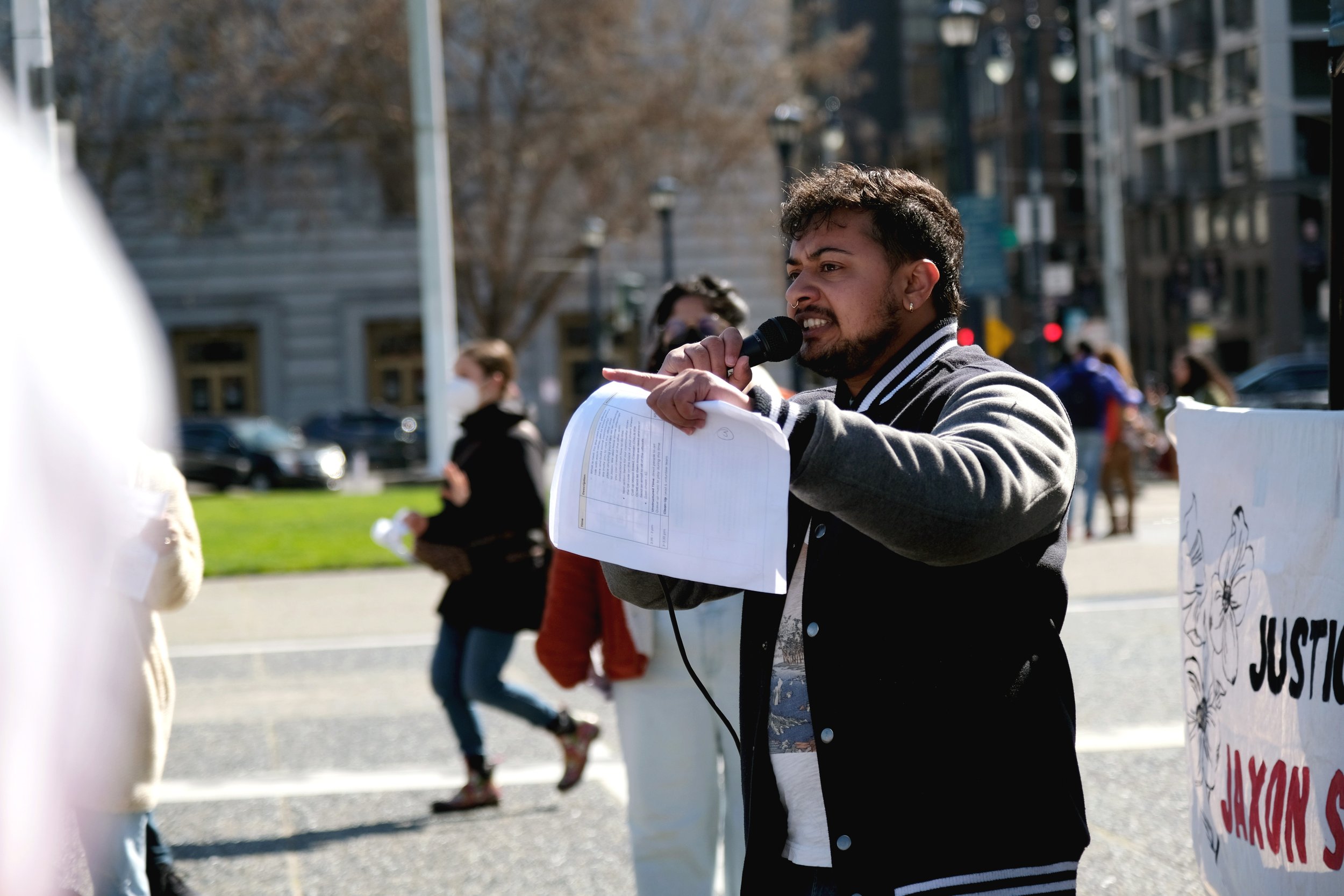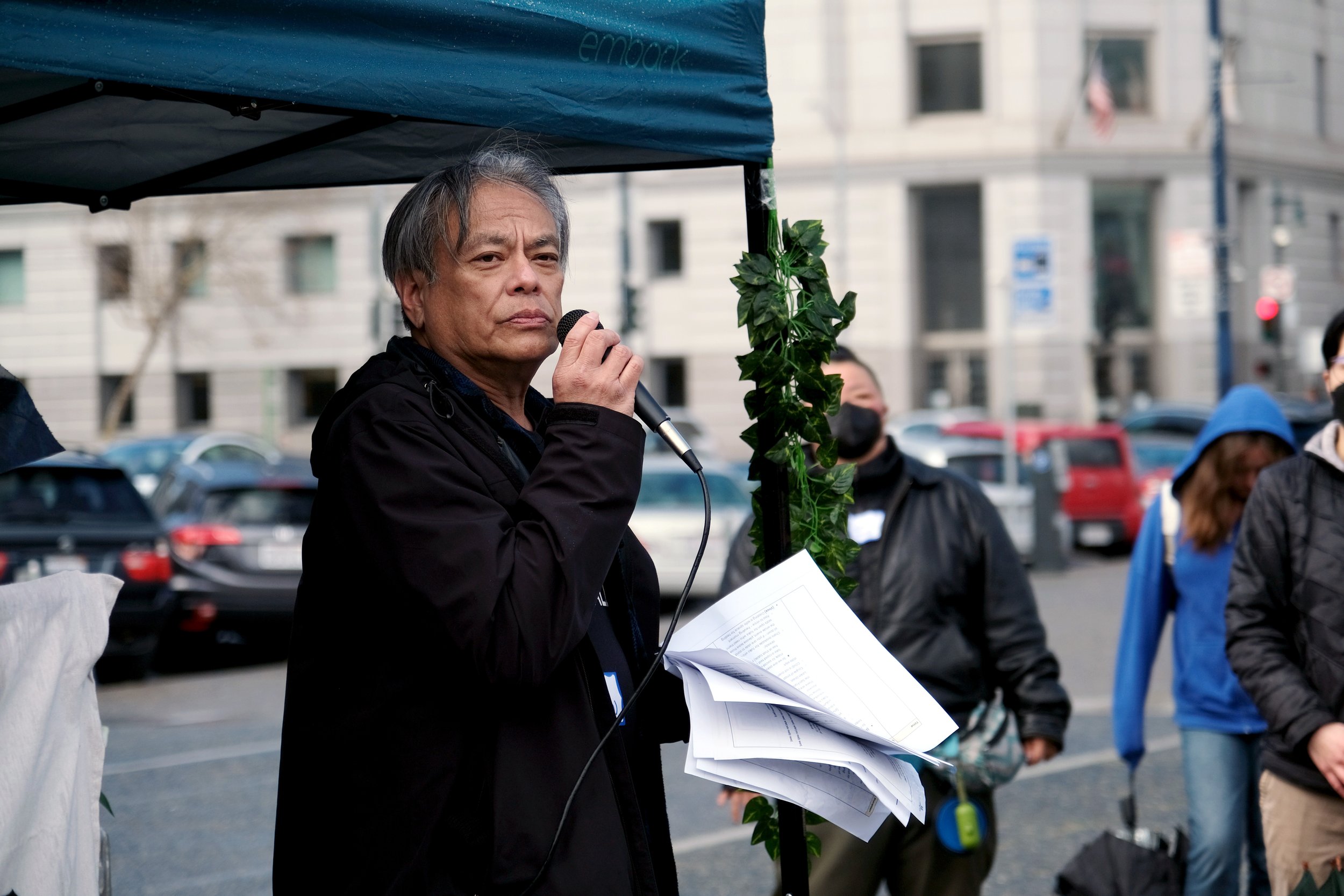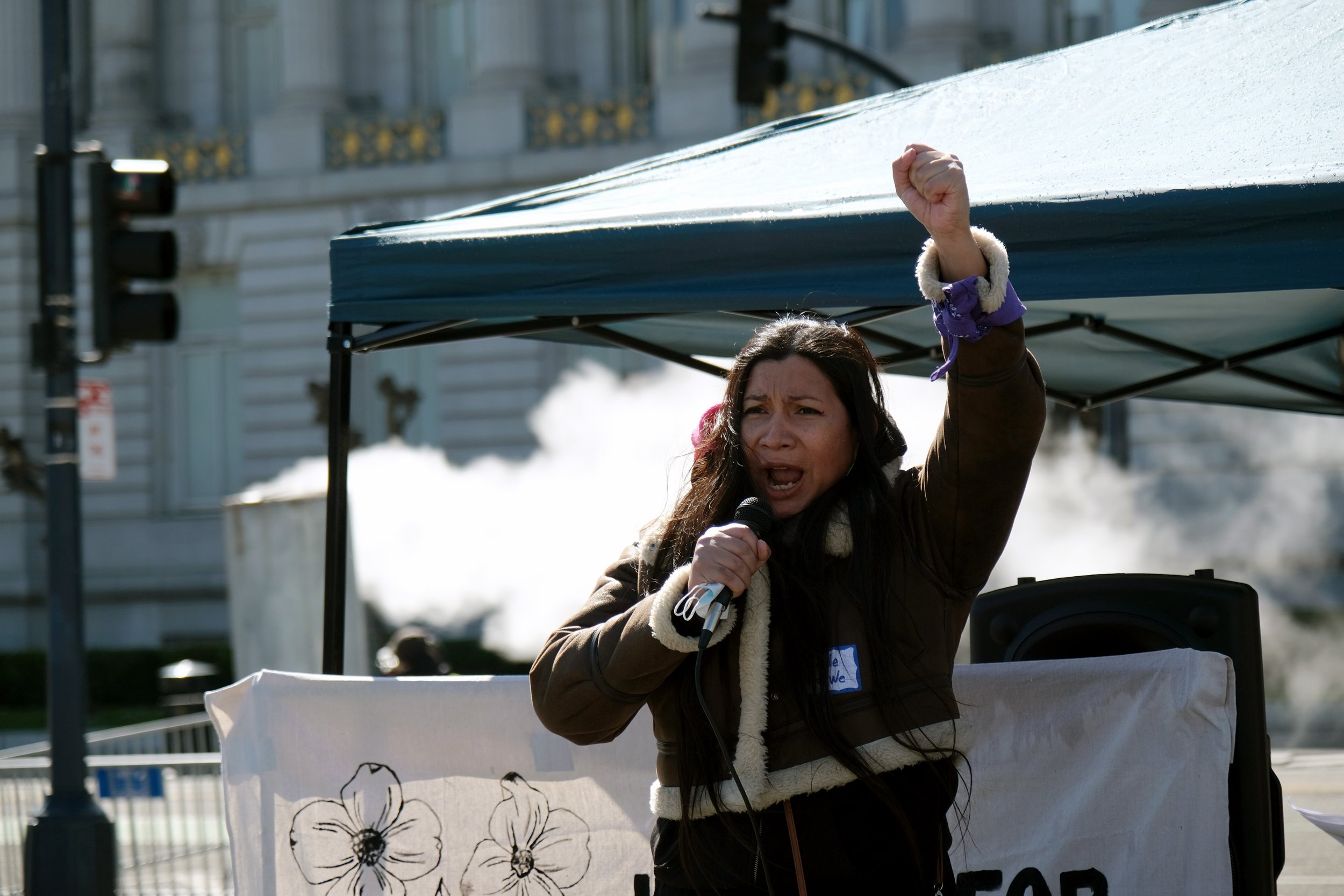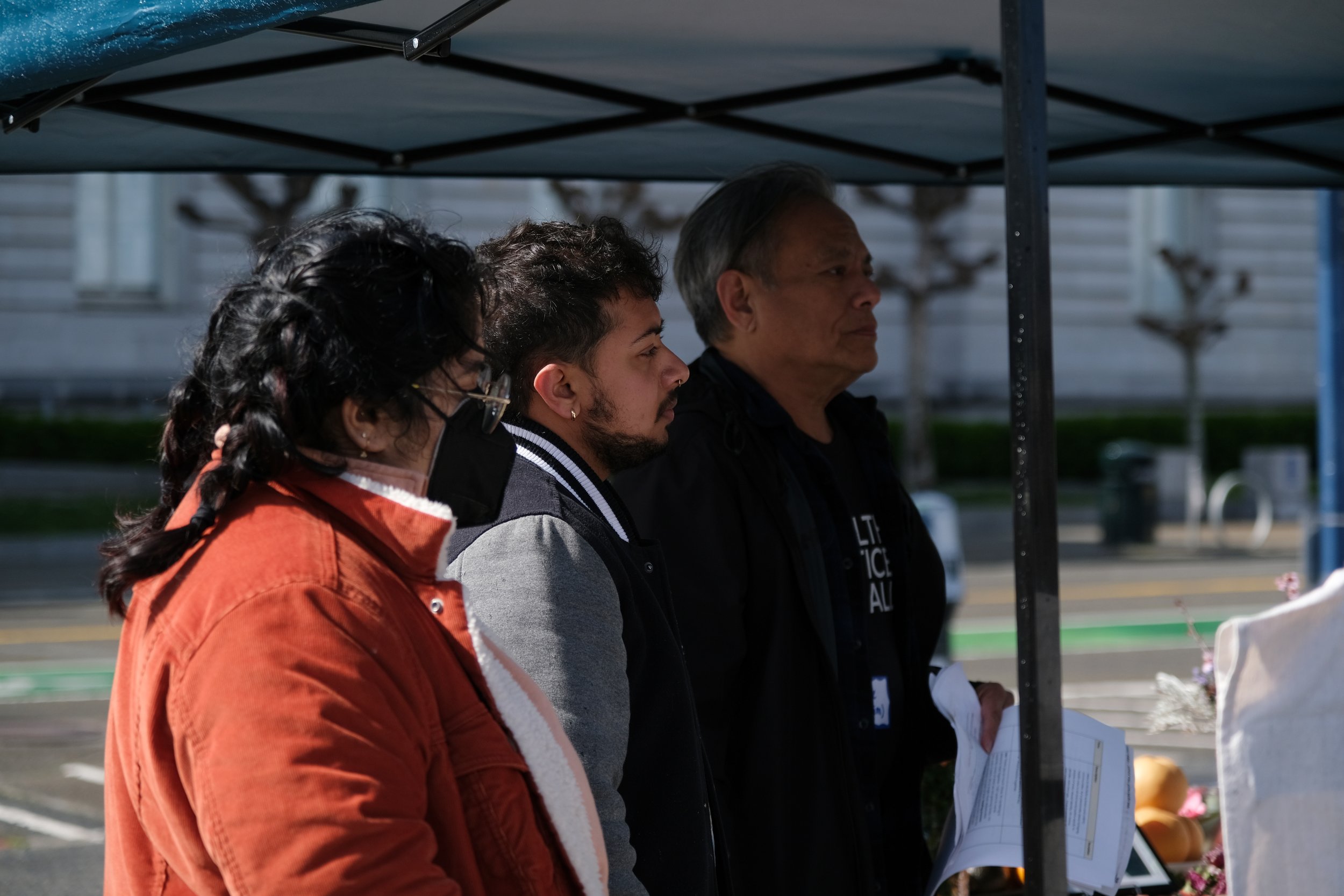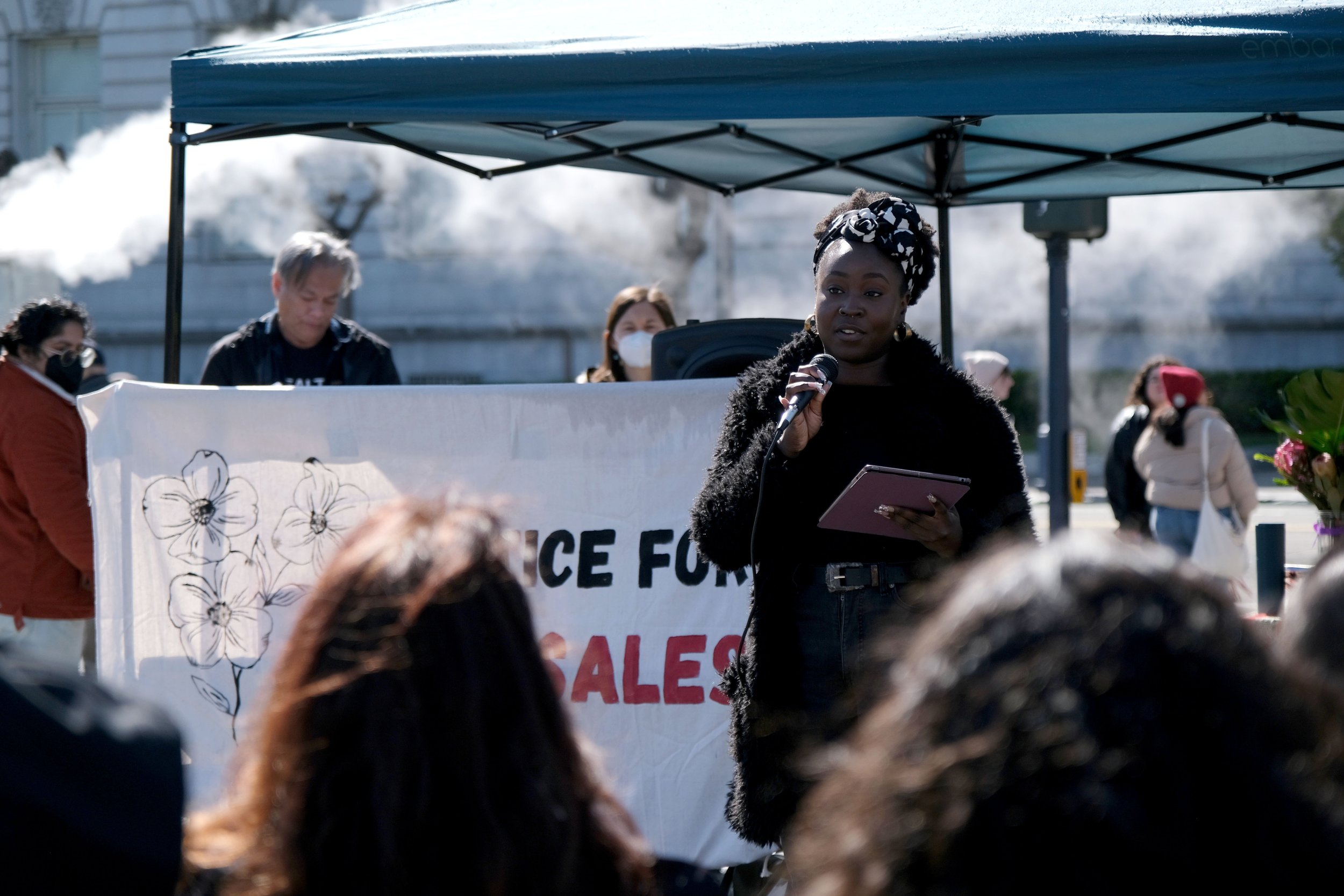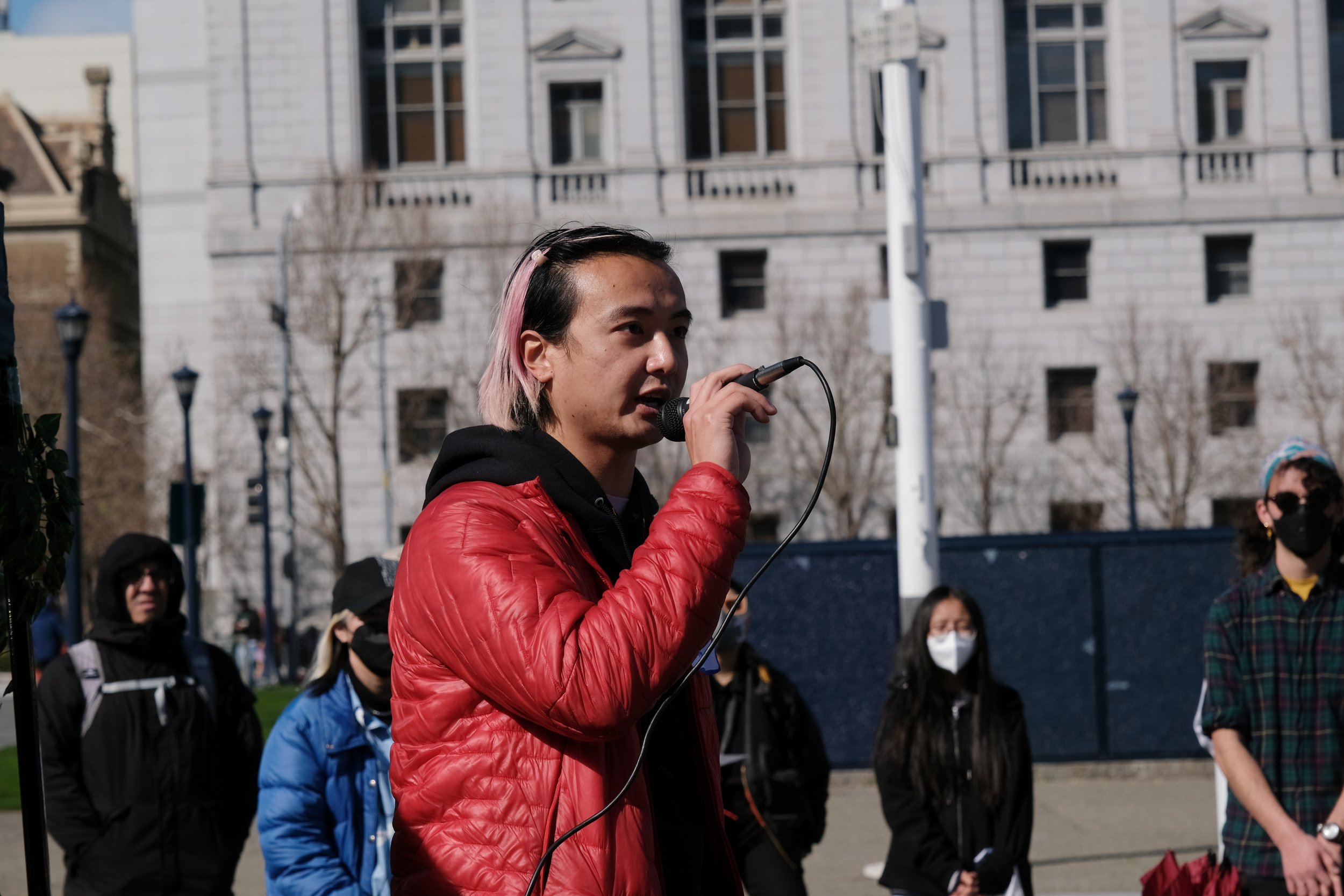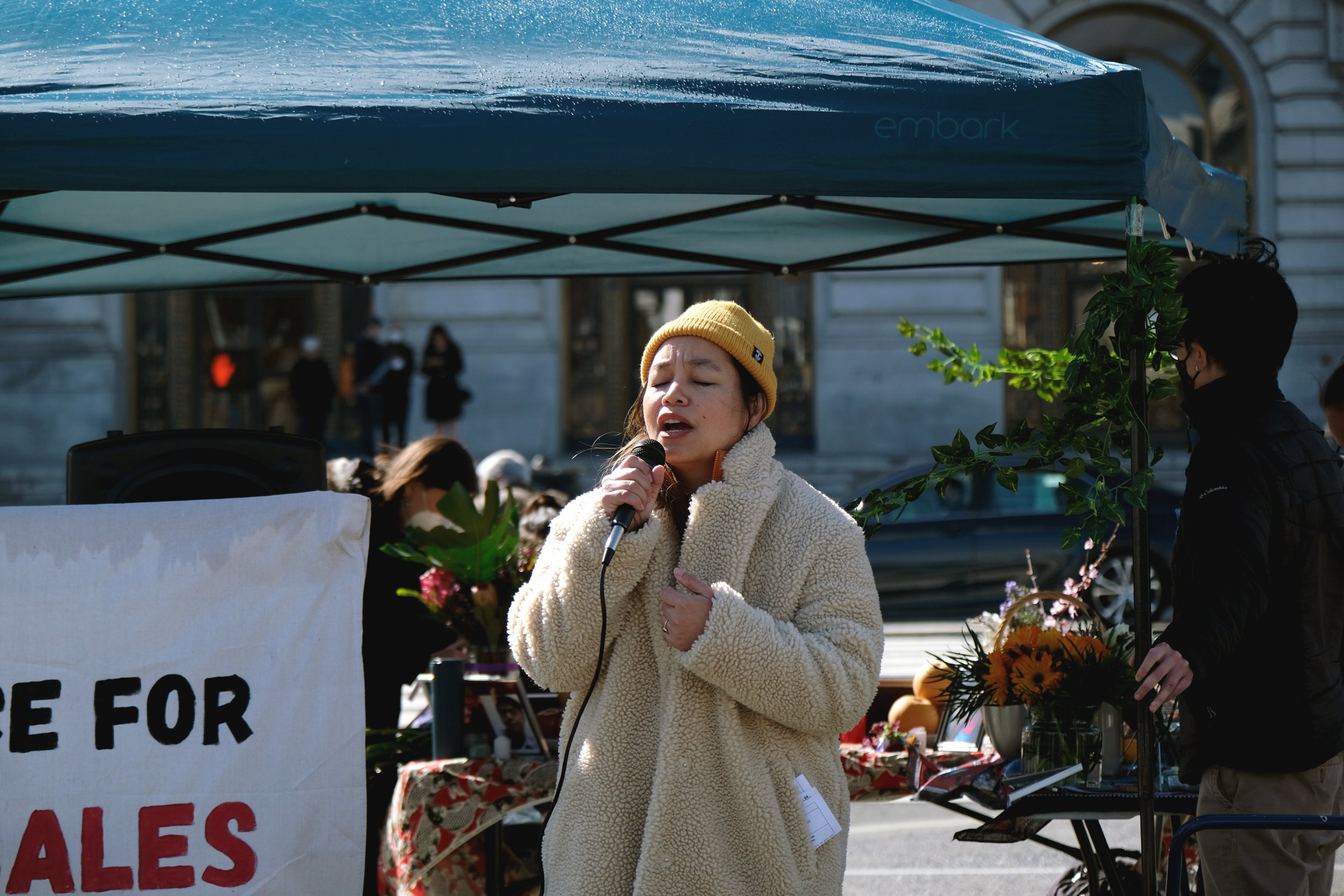Family of Jaxon Sales continues to demand transparency and accountability four years after his tragic passing
(Left to right) Jim Sales and Angie Aquino-Sales share stories of their son Jaxon Sales during a community gathering in his honor at Civic Center Plaza in San Francisco on March 4, 2023. Photo: @mugsy.rock
Editor’s note: This article contains discussions and descriptions of violence, discrimination, and abuse against LGBTQIA+ community members. Reader discretion is advised, as the content may be triggering or distressing for individuals who have faced similar experiences. Please take precautions to prioritize your mental well-being while reading.
Witty, thoughtful, and well-spoken, Jaxon Sales had a radiant charisma that left lasting impressions on everyone he knew. Adopted from Seoul in 1999, he grew up with an insatiable curiosity and unwavering work ethic that fueled his dedication to social justice, a cause that his mother, father, and older brother continue to champion even after his tragic death on March 2, 2020.
Many questions remain unresolved about what happened to Jaxon, who was found naked and dead in a Rincon Hill high-rise apartment belonging to a 41-year-old white man who had hosted a gathering the night before. Lead Investigator Michael Suchovicki of the San Francisco Office of the Chief Medical Examiner (SF OCME) attributed Jaxon’s death to an accidental self-inflicted drug overdose of gamma hydroxybutyrate (GHB), commonly known as a date rape drug. Based on the OCME’s sole medical determination, the San Francisco Police Department (SFPD) ruled the incident as an accident—with no evidence of foul play—and closed the case.
Four years later, Angie Aquino-Sales and Jim Sales continue their fight for answers, demanding a thorough forensic investigation that examines the circumstances of their 20-year-old son’s death. But their efforts to obtain the truth have been met with apathy and neglect.
According to the family, an Assistant Chief Medical Examiner suggested that a substantive investigation was unnecessary because “the gay community uses GHB.” The SF OCME refused to provide additional information or investigation despite repeated requests sent between 2022 and 2023 by the Sales family, their attorney Glenn D. Magpantay, and California State Senator Scott Wiener.
Frustrated by the lack of attention and care, Angie and Jim began a Change.org petition to pressure SFPD and the SF OCME to reopen Jaxon’s case and conduct a proper investigation. They also filed a civil case against the apartment renter, a second white man who may have assisted in luring Jaxon to the apartment, and the managing firm of the building where Jaxon was found.
“Jaxon’s life mattered. Those in contact with him in the 24 hours preceding his death should be held accountable for actions that did not have his best interest and resulted in the loss of his life. Those whose job it is to determine what happened to him should perform their duties very seriously as if it was their own child or family member who experienced a death that should have never happened,” Angie said in a statement.
A photograph of 20-year-old Jaxon Sales rests on an altar at the "Justice for Jaxon Sales: Gathering for Action" in San Francisco on March 4, 2023. Photo: @mugsy.rock
Jaxon’s case has revealed limitations in the criminal legal system for victims to achieve justice. Because the OCME attributed Jaxon’s death to an accident, SFPD can not conduct a criminal investigation to determine the cause of death. And without a conclusive investigation, the District Attorney is unable to prosecute those responsible.
Magpantay, a long-time civil rights lawyer, filed petitions on behalf of the Sales family in February 2023 to the California State Attorney General, San Francisco District Attorney, San Francisco City Attorney, and San Francisco Chief of Police. The petitions requested that the SF OCME hold an inquest without prejudicial LGBTQ bias to determine the circumstances and manner of Jaxon’s death.
“I want them to think like a parent and understand that you don’t get to see your child coming through the door anymore. You don’t get to argue with this child. You don’t get to see this child graduate, have a wedding, or have children of their own. I want them to understand that their decisions have impacts,” Angie said.
The petition for the inquest raised various concerns, including Suchovicki’s known history of faulty investigations and reports from former staff of mismanagement within the SF OCME. The office, which lacked accreditation at the time of Jaxon’s death, neglected to investigate his body for signs of rape despite the presence of GHB in his system and another overdose at the same residence two days earlier.
However, California State Attorney General Rob Bonta denied the request, stating in a letter issued to the Sales family on June 14, 2023, that the Department of Justice “does not believe that an inquest would further the investigation or assist in bringing it to a close.”
“What you’re seeing now with the Jaxon case is very much an endemic example of the system that we have. The law is limited in its pursuit of justice. There are strives for justice, but there’s not always a delivery of justice,” Magpantay said.
(Left to right) Jim Sales and Angie Aquino-Sales continue to seek justice and accountability following the untimely loss of their son, Jaxon Sales on March 2, 2020. Photo: @mugsy.rock
Magpantay says the deaths of LGBTQIA+ people of color are too often under-investigated or ignored. Over the last decade, 44% of cases involving violence against transgender and gender non-conforming individuals have gone unsolved or not prosecuted, according to a 2022 report from the Human Rights Campaign. In these cases, no arrest has been made, the killer remains unknown, or a named suspect is still at large.
“The work that we’re doing on this case is part and parcel of the campaign to draw attention to the victims, to have the processes of law enforcement, medical examiners, and coroners fully investigate and address the harassment, killing, and the injustice of queer and trans people of color,” Magpantay said.
Committed to honoring their son’s memory, Angie and Jim stress that every human being, regardless of gender, ethnicity, or sexual orientation, should have equal access, care, and attention in pursuit of justice.
“Who Jaxon was makes me want to continue this fight for justice. The way he died and the treatment that we got after his death is something that we didn’t deserve, and it’s something that he doesn’t deserve. He’s not just another statistic of someone who died of an overdose,” Jim said.
Organizations like Lavender Phoenix have rallied behind the Justice for Jaxon Sales campaign, supporting the family’s ongoing fight for truth, justice, and safety through vigils and local actions.
“We didn’t expect so many people to come out and just sympathize with our situation and relate to what Jaxon has gone through. This isn’t an isolated incident. This could have happened to anyone,” Jim said.
Community organizers Renuka Garg and Cynthia Fong remember the moment when they first learned about Jaxon and his family. Although taken aback by what happened, they see Jaxon’s experience as part of a larger pattern of state violence and negligence, even in a place like San Francisco, which has long been regarded as a safe refuge for the LGBTQIA+ community.
“It feels like we’re in a city built on pinkwashing. The politics espouse many liberal values and leftist talking points, but the material conditions we see, like annual increases to the San Francisco Police Department’s budget, are uncontested. We know that does not create long-term safety or make our communities thrive. What we really need is to have our basic needs met,” Garg said.
In 2019, Lavender Phoenix led a community-based action research project that centers the experiences of LGBTQIA+ Asian and Pacific Islanders in the San Francisco Bay Area. The comprehensive study drew insights from over 200 respondents, who emphasized the need for long-term community-centered solutions that provide affordable holistic care and address the root causes of violence.
The majority of participants reported experiencing intimidation, racism, and harassment from law enforcement. 79% of respondents felt uncomfortable asking police for help, and more than half said they were rarely treated with respect by police. Among the key findings included calls for increased investment in community spaces, systems, and skills that promote safety, particularly when responding to moments of crisis.
Jim Sales and Angie Aquino-Sales alongside friends, family, and members of Lavender Phoenix at the “Justice for Jaxon Sales: Gathering for Action” at Civic Center Plaza in San Francisco on March 4, 2023. Photo: @mugsy.rock
“There are so many examples of the ways in which our learned responses to harm, hurt, and violence directly contradict the responses that are actually necessary,” Garg said. “Jaxon should still be here. There was no reason for him to die, and we must do everything in our power to ensure that we build a world in which Jaxon could have lived and thrived.”
Rooted in the histories and experiences of transgender, non-binary, and queer Asian and Pacific Islander people, Lavender Phoenix trains young leaders to build powerful movement ecosystems that work toward true healing and safety for all. Through their member-led Healing Justice and Community Safety committees, they have provided culturally competent workshops and training to help individuals respond to harm, practice interdependence, and strengthen personal safety networks.
But achieving safety, justice, and recognition for all LGBTQIA+ people will require much more than Lavender Phoenix. The organization calls on allies, community centers, and organizations to take collective action with intention and care.
“The story of Jaxon Sales is connected to so many other stories of losing our young, trans, and queer folks like Banko Brown, another example of a militarized situation where a young life was lost unnecessarily,” Fong said. “With the proliferation of organizing that we see today, it’s clear that people believe a different world is possible.”
Photograph of Jaxon Sales with his father Jim, mother Angie, and older brother Alex at a family trip to Disney California Adventure Park. Photo: @mugsy.rock
The leadership and strength of the Sales family have had a profound impact on members of Lavender Phoenix.
“This mutual relationship and connection we’ve developed with Jim and Angie has been so transformative and meaningful for our membership of young trans and queer API folks. Witnessing Angie, Jim, Alex, and their entire family demonstrate such love, dedication, and commitment has been a healing experience,” Fong said.
Angie attributes Lavender Phoenix as one of the few places where the Sales family can process their grief. She calls on the broader Filipino American community to join the campaign and support individuals impacted by a flawed criminal legal system.
“Jaxon may have been Korean and not Filipino, but he was taught and raised in a Filipino family. We need the community to rally more because something like this could happen again if we forget. That’s the one thing we don’t want to happen,” Angie said.
Despite the uncertainty, the Sales family remembers Jaxon’s life and the kindness, laughter, and love he brought to the world. In an Instagram post honoring the fourth anniversary of his passing, they wrote:
“Our hope is that if you knew him or got to know him over these past few years, that every so often, you’ll take a moment to remember him, share a smile or laugh with someone for him, and continue to send us your good thoughts as we push forward to find justice and accountability.”




